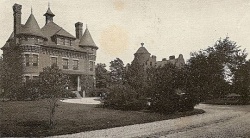Difference between revisions of "Toledo State Hospital"
M-Explorer (talk | contribs) (Created page with '{{infobox institution | name = Toledo State Hospital | image = Toledo11.jpg | image_size = 250px | alt = Toledo State Hospital | caption = | established = | construction_began =…') |
m |
||
| Line 8: | Line 8: | ||
| construction_began = 1888 | | construction_began = 1888 | ||
| construction_ended = | | construction_ended = | ||
| − | | opened = | + | | opened = 1888 |
| closed = | | closed = | ||
| − | | demolished = | + | | demolished = 1990s |
| current_status = [[Demolished Institution|Demolished]] | | current_status = [[Demolished Institution|Demolished]] | ||
| building_style = [[Cottage Planned Institutions|Cottage Plan]] | | building_style = [[Cottage Planned Institutions|Cottage Plan]] | ||
| architect(s) = | | architect(s) = | ||
| − | | location = | + | | location = Toledo, OH |
| architecture_style = | | architecture_style = | ||
| − | | peak_patient_population = | + | | peak_patient_population = 3,500 early 1950s |
| alternate_names = | | alternate_names = | ||
Toledo Insane Asylum | Toledo Insane Asylum | ||
| Line 24: | Line 24: | ||
The “cottage system,” as it became known, was conceived by General Roeliff Brinkerhoff, the founder of the Ohio State Archeological and Historical Society, who believed in abolishing the use of mechanical restraints in the treatment of the insane, and housing them in cottages to allow them the feelings of self-worth and independence while under the care of the state. The Mission Statement and Philosophy of the Asylum read, “To many the subject of caring for the insane is…a mystery. The secret of their care and keeping them contented is to have them lead as normal a life as possible, with good clean, healthy surroundings, plenty of nourishing food, and fresh air.” | The “cottage system,” as it became known, was conceived by General Roeliff Brinkerhoff, the founder of the Ohio State Archeological and Historical Society, who believed in abolishing the use of mechanical restraints in the treatment of the insane, and housing them in cottages to allow them the feelings of self-worth and independence while under the care of the state. The Mission Statement and Philosophy of the Asylum read, “To many the subject of caring for the insane is…a mystery. The secret of their care and keeping them contented is to have them lead as normal a life as possible, with good clean, healthy surroundings, plenty of nourishing food, and fresh air.” | ||
| − | The Asylum began moving patients off of the property in the early 1970s, and the buildings were destroyed in | + | The Asylum began moving patients off of the property in the early 1970s, and the buildings were destroyed in the early 1990s. Northcoast Behavioral Healthcare, located on the same site, is the current treatment center and psychiatric hospital in Toledo and is owned and operated by the state of Ohio. |
== Images of Toledo State Hospital == | == Images of Toledo State Hospital == | ||
| Line 32: | Line 32: | ||
File:Toledo12.jpg | File:Toledo12.jpg | ||
File:Toledo OH FemaleBldg.jpg | File:Toledo OH FemaleBldg.jpg | ||
| + | file:Book01d.jpg | ||
| + | file:Book03a.jpg | ||
</gallery> | </gallery> | ||
Revision as of 03:39, 8 May 2010
| Toledo State Hospital | |
|---|---|
 | |
| Construction Began | 1888 |
| Opened | 1888 |
| Demolished | 1990s |
| Current Status | Demolished |
| Building Style | Cottage Plan |
| Location | Toledo, OH |
| Peak Patient Population | 3,500 early 1950s |
| Alternate Names | Toledo Insane Asylum |
Designed by prominent Toledo architect, Edward O. Fallis, the Toledo Asylum for the Insane opened for occupancy in 1888, with Dr. Henry A. Tobey as superintendent. It was built on 150 acres of land located at the corner of Arlington and Detroit Avenues, and its design was based upon the cottage model which was a revolutionary concept at the time. There were thirty four buildings, twenty of which were pavilions or “cottages” that housed the “less extreme cases” of insane individuals, while six buildings--two infirm wards, two hospitals, and two strong wards--housed those considered more “critically insane” or “incurable.” The grounds also featured man-made lagoons, an administration building, a farm, an auditorium, a greenhouse, and a chapel. The maximum capacity of the entire project could house 1,800 patients.
The “cottage system,” as it became known, was conceived by General Roeliff Brinkerhoff, the founder of the Ohio State Archeological and Historical Society, who believed in abolishing the use of mechanical restraints in the treatment of the insane, and housing them in cottages to allow them the feelings of self-worth and independence while under the care of the state. The Mission Statement and Philosophy of the Asylum read, “To many the subject of caring for the insane is…a mystery. The secret of their care and keeping them contented is to have them lead as normal a life as possible, with good clean, healthy surroundings, plenty of nourishing food, and fresh air.” The Asylum began moving patients off of the property in the early 1970s, and the buildings were destroyed in the early 1990s. Northcoast Behavioral Healthcare, located on the same site, is the current treatment center and psychiatric hospital in Toledo and is owned and operated by the state of Ohio.
Images of Toledo State Hospital
Main Image Gallery: Toledo State Hospital



